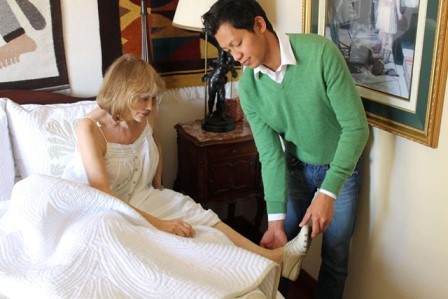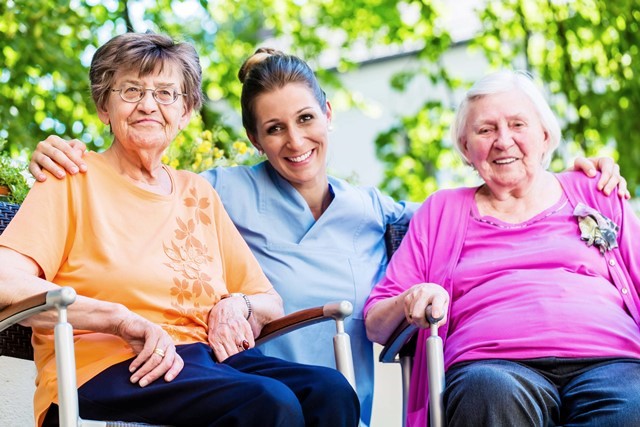
Eye Problems in the Elderly
June 6, 2016
Dealing with Arthritis
June 11, 2016Parkinson’s disease is one of the most common neurodegenerative diseases in the United States. It affects approximately 1 million people and there are about 60,000 new cases diagnosed each year.
Seniors with this condition often need help around the home to perform simple tasks like getting dressed, preparing dinner and taking their medications. This article will take a closer look at helping seniors deal with Parkinson’s disease and the ways in which home care may be able to help.
What is Parkinson’s Disease?
Parkinson’s disease is a degenerative condition of the central nervous system. People with Parkinson’s disease have cell death in a part of the brain called the substantia nigra. This results in decreased levels of dopamine being produced by the brain.
Dopamine is an important neurotransmitter that helps the brain control movement. Scientists don’t know what causes cells to die in the substantia nigra but suspect a genetic defect is involved.
The condition mostly affects the motor system, making it difficult for a person to control their movements. Typically, a person with Parkinson’s will have the following symptoms:
- Shaking limbs
- Difficulty walking and an imbalanced gait
- Stooped posture
- Rigidity
- Slowness of movement
- Thinking problems
- Problems sleeping
- Emotional problems
Late-stage Parkinson’s disease begins to cause more mental and emotional problems. It is common for people with late-stage Parkinson’s disease to develop depression.
There are two variations of the disease, primary and secondary Parkinson’s. Scientists don’t know the cause of primary Parkinson’s but suspect it has a genetic origin. Secondary Parkinson’s disease is caused by exposure to certain toxins, some of which are found in pesticides. Head injuries can also increase a person’s risk of having Parkinson’s disease.
Scientists have identified a number of ways for people to lower their risk of having Parkinson’s disease including exercise, boosting vitamin D intake, eating foods high in antioxidants, and not smoking tobacco.
Parkinson’s Disease Treatments
Unfortunately, there is no cure for Parkinson’s disease. However, it can be treated in a number of ways including:
- Drugs
There are a number of drugs which attempt to increase the amount of dopamine in your system, including Levodopa, Apomorphine, Bromocriptine, Pergolide, Pramipexole, and lisuride and MAO-B inhibitors. Unfortunately, some of these drugs have significant side-effects. - Surgery
Since Levodopa was developed, the number of surgeries used to treat Parkinson’s disease has declined. However, Deep Brain Stimulation (DBS) is still used in some cases. It involves placing a small neurostimulator in the brain to send electric impulses to block the communications from the brain. This will minimize or reduce the symptoms of Parkinson’s disease like shaking and tremors. - Rehabilitation
A variety of exercises and physiotherapy techniques have been shown to slow the progression of the disease and help preserve mobility. Some studies suggest that deep breathing exercises and meditation can also help a Parkinson’s sufferer maintain their capabilities.
How Home Care Can Help
Non-medical home care can help a person with Parkinson’s deal with their disease in the comfort of their own home. Some of the ways home care can help include:
Ensuring the home is a safe environment
Parkinson’s disease can severely affect a person’s mobility and increase their risk of having a fall. Home care professionals can ensure that the home is free of trip hazards, has adequate lighting and that there are clear pathways around the home.
Preparing meals
A person with Parkinson’s can find it very difficult to prepare nutritious meals in their home. In fact, in can be very dangerous for them to do so. Caregivers can help prepare meals in the home or supply pre-made meals. Home care staff can ensure that the client receives healthy, delicious and nutritious food.
Assistance taking medications
Home care staff can help a client with their medications in a number of ways. They can pick up prescriptions from the pharmacy on the client’s behalf and also remind the client when to take them. Home care agencies with an on-staff nurse could also manage a person’s medications with a weekly compartment pill organizer.
Cleaning the home
Home care staff can perform domestic duties around the home including laundry and light house cleaning.
Providing companionship
Dealing with the physical and mental aspects of Parkinson’s disease can be very difficult. Home care staff can spend time with the client, providing companionship and helping them deal with this difficult illness.
Providing transportation and assistance getting to doctor’s appointments
Leaving the home can becomes difficult for Parkinson’s sufferers. Eventually, they are unable to drive and taking public transport is impossible. A home care professional can provide transportation service to various social events and doctor’s appointments, helping the client to remain active and healthy.
Assistance with rehabilitation exercises
Research shows that rehabilitation exercises may be useful for slowing the progression of Parkinson’s disease. A home care professional can help the client perform these exercises safely and correctly.
We hope you found this article with helping seniors deal with Parkinson’s disease was informative. If you have any questions about managing Parkinson’s disease, contact All Heart Home Care at 619-736-4677. We offer in-home consultations and would love to discuss the many home care services available.








